
December 2018
Inside Higher Ed Editor Scott Jaschik to Speak at March Annual Conference

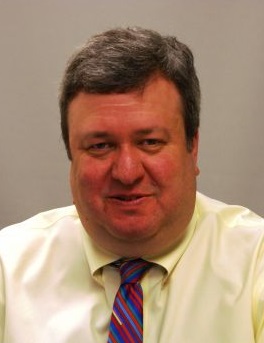 One of the nation’s most respected experts on issues in higher education will address registrants during the AAVMC’s Annual Conference in March. Scott Jaschik, editor of Inside Higher Ed, will present a plenary address during the opening afternoon program on Friday, March 8.
One of the nation’s most respected experts on issues in higher education will address registrants during the AAVMC’s Annual Conference in March. Scott Jaschik, editor of Inside Higher Ed, will present a plenary address during the opening afternoon program on Friday, March 8.Registration is now open for the AAVMC’s 2019 Annual Conference, which will be held March 8-10, 2019 at the Hyatt Regency Washington on Capitol Hill.
Inside Higher Ed is an online news-magazine with a circulation of 1.9 million readers that provides news, analysis and opinion on higher education.
Jaschik co-founded the widely followed online magazine in 2004 with two others, all of whom had been working with the Chronicle for Higher Education. Jaschik served as editor of the Chronicle from 1999-2003.
Jaschik is quoted regularly in publications nationwide, including The New York Times, The Boston Globe, The Washington Post, Salon, and others. He has served as a judge or screener for the National Magazine Awards, the Online Journalism Awards, the Folio Editorial Excellence Awards, and the Education Writers Association Awards. He is a member of the board of the Education Writers Association.
Scott grew up in Rochester, N.Y., and graduated from Cornell University in 1985. He lives in Washington.
Register now for the AAVMC’s 2019 Annual Conference. Early registration incentives expire on December 31.
Veterinary College Administration: A Solid Foundation for University Leadership
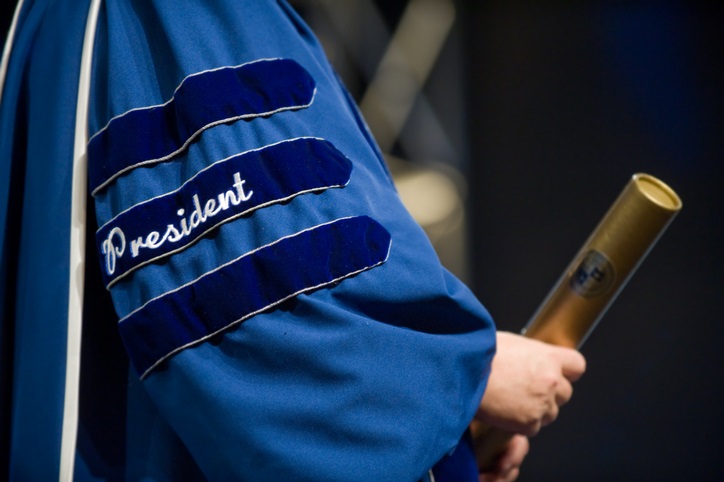 There’s no shortage of worries facing university leaders these days. Rising costs, diminished public support, tuition, student debt, diversity and inclusion, technology issues, conflict, recruitment, regulations and accountability are just a few of the things weighing on the minds of Presidents and Provosts.
There’s no shortage of worries facing university leaders these days. Rising costs, diminished public support, tuition, student debt, diversity and inclusion, technology issues, conflict, recruitment, regulations and accountability are just a few of the things weighing on the minds of Presidents and Provosts. We at the Vet-Med Educator recently grew curious about how many veterinary college deans had moved on to serve in senior leadership positions in higher education. Though assembled through word-of-mouth and internet searches, we quickly compiled a list of 22. We began to wonder about some of the qualifications and experiences that help make veterinary college deans uniquely qualified for service in higher office. So we checked in with a few respected leaders.
“Veterinarians are uniquely qualified to be campus-wide administrators as a result of their training,” said Dr. Joe DiPietro, who recently retired as President of the University of Tennessee Chancellor of the UT System. “The comparative nature of our multi-species training is helpful in coping and adapting as needed with the very complex and widely diverse nature of large universities.”
The breadth of a veterinary college dean’s responsibilities more accurately reflects the scope of a larger university than most other colleges on campus, agrees AAVMC Senior Accreditation Advisor Dr. Sheila Allen, who served as dean of the University of Georgia College of Veterinary Medicine for 11 years.
Veterinary college deans gain the experience of running a broad enterprise with very distinct programs in education, research and public service, she said. For example, deans are responsible for the operations of large, complex Veterinary Teaching Hospitals. In some cases, they operate statewide diagnostic facilities in cooperation with other agencies.
They administer complex basic and applied research programs funded by organizations ranging from the National Institutes of Health and the Department of Defense and the USDA to pharmaceutical companies and animal commodity organizations. They often address statewide responsibilities with continuing education and public service.
Also, according to Allen, different funding paradigms in different states and university systems mean budgets are often constructed from a broader array of sources than other college budgets on campus. And physical plant responsibilities often involve large capital projects and complicated renovation and maintenance associated with clinical facilities and laboratories, she added.
Dr. Eleanor Green, dean of the Texas A&M University College of Veterinary Medicine and Biomedical Sciences, concurs that the broad nature of the profession and leadership in academic veterinary medicine provide a special quality of experience.
“Veterinarians receive broad, basic training in comparative medicine, allowing them to understand complex issues and think beyond their own spheres,” she said. “This contributes to open mindedness, receptivity to new ideas, and wide-ranging responsibility.”
She also believes that intrinsic qualities and values associated with the nature of the profession, such as those articulated in the “Veterinarian’s Oath” itself, are important to consider. “This is an interesting mix of social contract, compassion for animals and people, and scientific curiosity,” said Green. “The importance of integrity, professionalism, and ethics is underscored in veterinary training.”
The problem-solving skills one gains through studying and practicing veterinary medicine also work well in the dynamic, complex operating environments associated with modern universities, according to DiPietro.
“The problem-solving approach I was taught in veterinary school and utilized as a practitioner on my patients is extremely valuable when I am dealing with problems at the University of Tennessee,” said DiPietro, who served as dean at the University of Florida College of Veterinary Medicine before rising to lead the University of Tennessee system. “Grappling with a university problem by subjectively and objectively evaluating it, doing an assessment and laying a plan to solve it, as well as revisiting progress towards its resolution with the same process has served me well, is ideal, and is highly effective.”
Green concurs: “Veterinarians have to think on their feet,” she said. “They face unusual circumstances with clients, patients, colleagues, and others frequently. Veterinarians must be heuristic. They learn to maneuver through grave situations, yet they find ways to find and share joy as they can.”
Green also believes that the service orientation, teamwork and sense of emotional intelligence required for success in veterinary medicine translates well to senior executive positions in higher education.
“Veterinarians interact and deal with diverse populations of people in a multitude of different situations in many aspects of their daily jobs,” said Green. “As such, communication skills are essential for their success. Understanding diversity is important for establishing a culture of inclusion, supporting their staff, and serving their clientele. These traits form a solid foundation for leadership.”
All agreed that the inherent challenges of leading a sophisticated enterprise like a college of veterinary medicine provide an excellent training ground for senior positions in university leadership.
“I believe our profession’s ability to manage a major university is frequently overlooked and academia would be well served to consider us seriously and appoint veterinarians as university leaders more often,” said DiPietro.
Final VMCAS Data Analysis Underscores Strong Applicant Demand
The final data analysis from VMCAS 2019 is complete and it affirms that applicant demand for admission to AAVMC member institutions through the Veterinary Medical College Application Service (VMCAS) grew substantially during the last cycle.A total of 8,151 individuals applied to attend veterinary medical college through VMCAS this cycle, which represents an 8.68 percent increase over the number of persons who submitted applicants last year. During the preceding two admissions cycles, the number of applicants increased about six percent year over year.
The total number of applications submitted was 40,565, which was up almost 11 percent. Each applicant applied through VMCAS to about five (5.2) institutions. The number of applications to U.S. schools totaled 36,431 (up almost 11 percent) and the number of applications to international schools was 4,156 (up over 11 percent).
Once again, the submit rate, or the number of individuals who register with the system and actually complete the application process stood at about 72 percent. Wynne said that figure has remained fairly constant for the past several years. Despite AAVMC efforts to encourage earlier submission, 45 percent of applications arrive during the final week
The 2019 cycle was launched on May 13, 2018 and was scheduled to close on September 17, 2018. Because of Hurricane Florence and the impact it had on some colleges and universities, the Admissions & Recruitment Committee elected to slightly extend the application deadline to September 21.
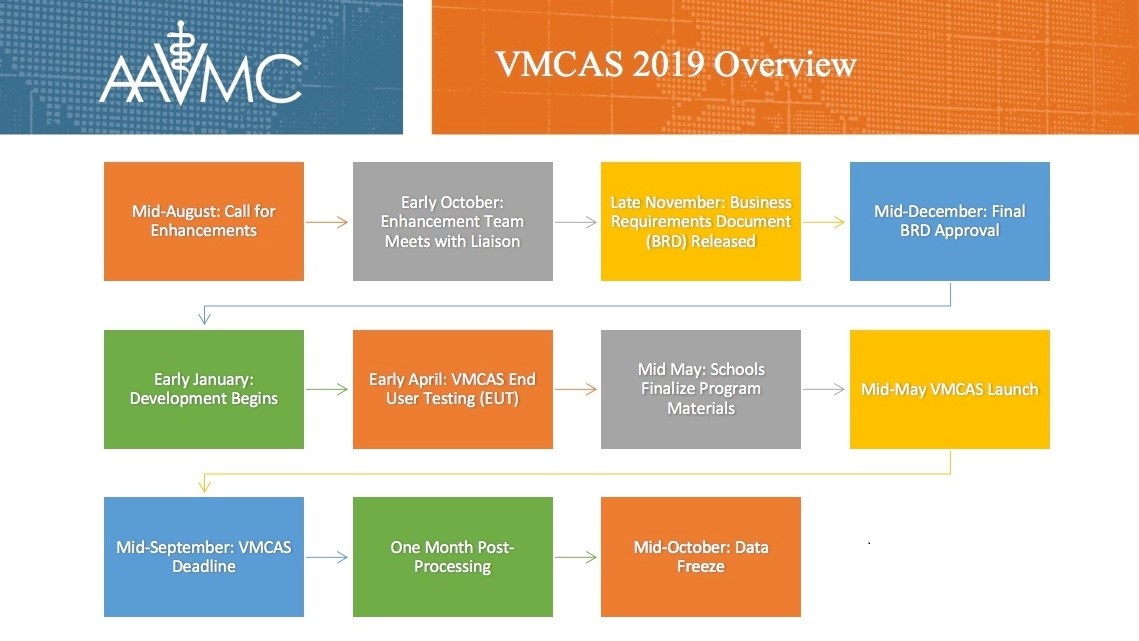
A total of 40 colleges and schools of veterinary medicine participate in the AAVMC’s VMCAS program. The University of Melbourne participated in the program for the first time this year.
While VMCAS program may only be “top-of-mind” for many during the “active” cycle, it is a systematic year-round program that involves a great deal of interaction between Liaison International, the Boston based contractor who operates the system, the AAVMC, and admissions representatives from member institutions, according to AAVMC Director of Recruitment and Admissions Tony Wynne.
The flow chart above depicts some of the main activities that occur around the year during a typical cycle.
Applicant data and behavior provide AAVMC and Admissions and Recruitment Committee (ARC) officials with insights that help create the most effective admissions programming.
Overall, the VMCAS system functioned well, with no major problems reported to the AAVMC or vendor Liaison International, according to Director of Recruitment and Admissions Tony Wynne.
Council on Education (COE) Update and Activities: Members, Site Visitors Sought
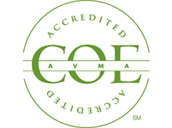 The Council on Education is tackling a busy agenda that includes process improvement, a robust agenda of site visits, and participation in the U.S. Department of Education’s every five-year re-recognition program, according to AAVMC Senior Accreditation Advisor Dr. Sheila Allen.
The Council on Education is tackling a busy agenda that includes process improvement, a robust agenda of site visits, and participation in the U.S. Department of Education’s every five-year re-recognition program, according to AAVMC Senior Accreditation Advisor Dr. Sheila Allen.The U.S. Department of Education’s (USDE) National Advisory Committee for Institutional Quality and Integrity (NACIQI) is conducting its periodic review of the Council on Education’s (COE) performance as the official accrediting agency for veterinary medical education programs. USDE staff members attended the COE site visitor training program and COE meeting held in September 2018, according to Dr. Allen. A public hearing to review the COE’s recognition will be held in Washington, D.C. on February 5, 2019.
Since the last Department of Education recognition, constructive changes have been made in how COE members are appointed and supported by the AAVMC and the AVMA, and Accreditation Standard improvements have been made in the areas of diversity and inclusion, student wellness, and programs in financial aid and educational debt awareness and counseling.
Site visitor training and recruitment programs have been enhanced, and the production of a new policies and procedures manual is also underway.
Because the first cohort of volunteer site visitors will complete their terms in 2019, the COE needs to recruit a new cohort of site visitors to serve terms from 2020-2026. Participation typically requires one five-day site visit per year, and completion of an initial three-day training program.
The COE is currently conducting a site visit at Seoul National University in South Korea (December 9-14). COE site visits currently scheduled during spring 2019 include the University of Bristol, February 24-28, 2019; Western University of Health Sciences, March 24-30, 2019; the University of Calgary, April 7-12, 2019; Texas Tech University, (Consultative) April 14-18, 2019; and the University of Arizona, May 12-16, 2019. The visits currently scheduled for the fall of 2019 include Michigan State University October 13-17, 2019, Louisiana State University November 3-7, 2019, Auburn University November 17-21, 2019, and Universite de Montreal December 8-12, 2019.
The COE currently includes 20 members: eight appointed by the AAVMC selection committee, and eight appointed by the AAVMC selection committee. There are 4 additional members: 3 public members appointed by the COE, and one Canadian representative appointed by the Canadian Veterinary Medical Association.
The COE is seeking to fill several upcoming vacancies. These positions are for six-year terms on the council. These include representatives from private equine practice (appointed by the AVMA selection committee), large animal clinical sciences (appointed by the AAVMC selection committee), and veterinary medical research (appointed by the AAVMC selection committee). The application and nomination procedures will be announced by the AVMA and AAVMC in January 2019.
If you are interested in learning more about serving as a site visitor or as a member of the COE, please contact Dr. Sheila Allen at sallen@aavmc.org, or Dr. Karen Brandt at kbrandt@avma.org.
AAVMC Monitors Generational Trends, Anticipates Gen Z
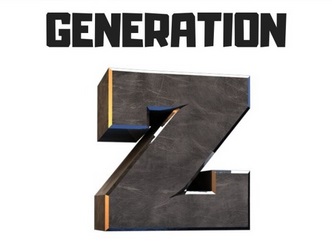 The Greatest Generation. Baby Boomers. Millennials. Gen Z. Evolving changes in culture, economics, technology and demographics tend to forge traits and values that define generations.
The Greatest Generation. Baby Boomers. Millennials. Gen Z. Evolving changes in culture, economics, technology and demographics tend to forge traits and values that define generations. In order to understand the motivations and needs of prospects and applicants, the AAVMC keeps a close eye on generational values and trends. Understanding what makes them tick and how they like to communicate is a key part of effectively connecting with them.
“It’s important for us as an association that we are responsive to the needs of the (veterinary) pipeline,” said Tony Wynne, the AAVMC’s director of Admissions and Recruitment Affairs during a recent episode of the Diversity and Inclusion on Air podcast.
During the podcast, Wynne explained the distinguishing attributes of Gen Z. The oldest members of Gen Z are now 23 years old and will be seated in veterinary medical school in the fall of 2019.
Wynne, who also directs the Veterinary Medical College Application Service (VMCAS), spoke with podcast host Lisa Greenhill, the AAVMC’s senior director of Institutional Research and Diversity, about how Gen Z is “a new breed” that is the first group to “not know life before technology.” As such, Wynne said, they’re technologically adroit and accustomed to doing their own, online research, mostly only consulting peers or other humans to validate what they’ve found online.
He pointed out that in the last 16 years the national population of children of color has grown by 26 percent, meaning that Gen Z is more diverse than previous generations, both demographically and in terms of values. They also tend to be more entrepreneurial and collaborative than previous generations and come from an applicant pool that draws from a larger percentage of low-income applicants, among other attributes.
Wynne believes it’s important to continually evaluate what approaches work best with each generation, both in terms of recruitment and the VMCAS application itself.
“I want to make sure that we’re asking the right questions in order to find students with the right attributes to make good veterinarians, not just good students,” he said.
Last summer, at the Liason International User Conference, Wynne presented a lecture titled “Recruiting Generation Z.” Wynne was asked to summarize his lecture into a blog post and you can read it here.
Click here to listen to the D&I On Air Podcast.
Diversity and Inclusion on Air Podcast Exceeding Goals
 The audience for the AAVMC’s Diversity and Inclusion on Air podcast, hosted by Senior Director of Institutional Research and Diversity Dr. Lisa Greenhill, is growing dramatically. Greenhill’s goal was to double the number of “listens” for the podcast from about 250 to 500 a month. In November 2018, the show was on track to hit 800 listens, far surpassing her goal. “For a small association podcast, these are great numbers!” she said.
The audience for the AAVMC’s Diversity and Inclusion on Air podcast, hosted by Senior Director of Institutional Research and Diversity Dr. Lisa Greenhill, is growing dramatically. Greenhill’s goal was to double the number of “listens” for the podcast from about 250 to 500 a month. In November 2018, the show was on track to hit 800 listens, far surpassing her goal. “For a small association podcast, these are great numbers!” she said.
The AAVMC launched the podcast in the fall of 2015. It features conversations about diversity, inclusion and veterinary medicine and covers a wide range of topics with guests from across the veterinary profession.
Some recent developments are:
- The Use of Pronouns has been heard more than 200 times since its release last month.
- A recent episode on Generation Z had more than 160 spins after just 14 days.
- All 42 posted shows have been heard at least two times in the last month (binge listeners!).
- Eighty percent of listens have occurred within the US, but the show has been heard in 29 countries in the last month including Canada, the UK, Turkey, China, Australia, the Netherlands, Japan and Mexico.
- The most popular episode is one on PRIDE VMC (formerly LGVMA) featuring Dr. Melinda Merck.
Greenhill recently taped a show on Minority Men in Veterinary Medicine, now available on YouTube, that will be released on Soundcloud after the New Year.
See a list of episodes here.
Call for CIVME Research Grant Program
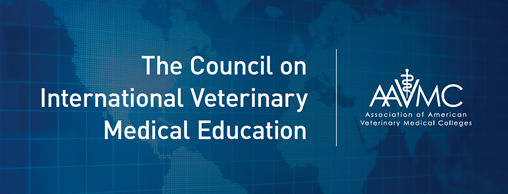 The Council on International Veterinary Medical Education (CIVME) is accepting grant proposals for the third annual cycle of the CIVME Research Grant Program. Proposals should support projects that promote international collaboration in veterinary medical education.
The Council on International Veterinary Medical Education (CIVME) is accepting grant proposals for the third annual cycle of the CIVME Research Grant Program. Proposals should support projects that promote international collaboration in veterinary medical education.
Total project budgets should not exceed $10,000 and are limited for a maximum period of 24 months. The application deadline is January 30, 2019 at 11 a.m. EST. Detailed information on the program is available here.
Preference will be given to applications that represent collaborative efforts between institutions and across regions. Potential applicants interested in collaboration but lacking partners are invited to contact CIVME at CIVME-grant@aavmc.org for assistance.
Proposals will be evaluated on criteria that include relevance, impact, fit with CIVME goals, feasibility, risk analysis, and others. Funded proposals will be announced during the AAVMC’s March 2019 annual meeting and in other communications.
The Council on International Veterinary Medical Education (CIVME) is an AAVMC initiative that seeks to promote and share best practices in veterinary medical education around the world. The council promotes:
- Communication and collaboration that advances international veterinary medical education
- Collaboration among educational researchers
- Dissemination of innovations and other educational advances among international members
2019 Soulsby Foundation One Health Fellowships Deadline January 31, 2018
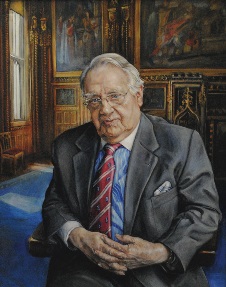 The Royal Society of Medicine is seeking applicants for the Soulsby Foundation Travelling Fellowships. The Fellowship program was founded to promote One Health and honors the late Lord Soulsby of Swaffham Prior in Great Britain.
The Royal Society of Medicine is seeking applicants for the Soulsby Foundation Travelling Fellowships. The Fellowship program was founded to promote One Health and honors the late Lord Soulsby of Swaffham Prior in Great Britain. Soulsby, who passed away in 2017, was former veterinary surgeon to the Queen, Dean of the Department of Veterinary Medicine at the University of Cambridge and an Honorary Fellow of the Royal Society of Medicine. He was the only individual to have served as President of both the Royal College of Veterinary Surgeons and the Royal Society of Medicine, as well as the only member of his profession in the House of Lords.
In 2015, Soulsby was awarded the Queen’s Medal by the Royal College of Veterinary Surgeons for leadership in “juxtaposing the worlds of medical and veterinary science.”
To honor his legacy, friends, colleagues and family members established the Soulsby Foundation, which seeks to inspire colleagues and students “to view animal and human medicine as one continuous health related tapestry.”
Up to two Soulsby Fellowships, funded at a level between £10,000 and £15,000 will be presented to a veterinarian or a physician who proposes to accomplish a meaningful project in the international field of One Health. The deadline for applying for a Soulsby Fellowship is January 31, 2019.
The charter awards were presented last year. The recipients of the 2018 Soulsby Fellowships were Dr. Camilla Benfield from the Royal Veterinary College in London and Dr. Andrew Stringer, Director of Global Health Education and Initiatives at the North Carolina State University College of Veterinary Medicine. Click here to read brief summaries of the work conducted by each as a result of their fellowships.
In the News
Transmission of Antibiotic Resistant E. coli Mapped in Wild Giraffe Social NetworksHealth Medicine Network
Sniffing for Science
USAgnet
The Price of Harassment
Today’s Veterinary Business
OSU Researchers Find Key Factors in Inflammation
News Channel 21
Animals Rescued by UCD Vets from Camp Fire
Daily Democrat
Researchers Discover Key Factors Behind Intestinal Inflammation in CVID Patients
Medicalnewser
New Way to Study Swallowing Could One Day Lead to Improved Treatments for ALS
Brightsurf
Fears Grow of a Swine Fever Epidemic in China
Asia Times
V Foundation Announces Grant-making Program for Canine Oncology Research
Veterinary Practice News
Telegram
Midwestern University CVM Gets Full Accreditation from AVMA Council on Education
Pharmbiz
COE Renews Accreditation of St. George’s Vet School
Mental Health Support at University of Saskatchewan’s Veterinary College
Global News
Virginia Tech Leads Study into Brain Trauma, Epilepsy Connection
WTKR
Hill’s Pet Nutrition Gift Prompts Kansas State Upgrade in Pet Animal Education
Topeka Capital-Journal
Animal Disease Experts from Africa get Specialist Training
Nambia Economist
Animal Study Demonstrates Feasibility of Treating Spinal Pain with Tissue Engineered Discs
Physical Therapy Products
Generation Debt (Or Not)
DVM 360
UF to Study Fatal Heart Disease in Doberman Pinschers
Veterinary Practice News
Arizona Veterinary College Hires Founding Dean
Today’s Veterinary Business
From Our Members
Cornell University
A Shot at Preventing Canine Cancer
University of Wisconsin
Veterinary College at Virginia Tech Unveils ‘Shilo’ Howling Beagle Statue
Virginia Maryland
LMU-CVM Hosts Inaugural Appalachia One Health Leadership Experience
Lincoln Memorial
People in Motion
Dr. Margaret (Peggy) C. Barr has been named as the Associate Dean for Academic Affairs at the Western University of Health Sciences.
Dr. Joanne Hewson has been named as the Associate Dean of Academic Affairs at Ontario Veterinary College.
“Like” us on Facebook or follow us on Twitter:




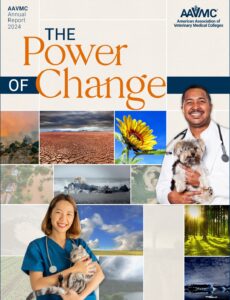
SHARE